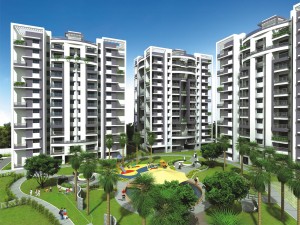 In some ways, Nigeria looks like a real-estate investor's dream. But there also are drawbacks to investing in Nigerian property.
In some ways, Nigeria looks like a real-estate investor's dream. But there also are drawbacks to investing in Nigerian property. In some ways, Nigeria looks like a real-estate investor's dream.
Africa's second-largest economy has an emerging middle class eager to shop in modern stores and is attracting many of the world's largest companies, which need offices. The country has a shortage of all types of modern space, raising the likelihood that the market will favor landlords for years to come.
But there also are drawbacks to investing in Nigerian property. For starters, the country ranked 96 out of 97 - one above Sudan - in the Jones Lang LaSalle 2012 global real-estate transparency index, which tracks the ease and confidence investors have in buying commercial real estate in a given country.
The result is a market that is seeing an increase in deals with high price tags from opportunistic funds willing to take a chance on Nigeria's potential. But the world's largest and most established investors continue to steer clear of the country.
Most of the investors who are active in the country are either local players or foreign funds that specialize in Africa. "You're not going to get the European pension money here" soon, says Mark Bradford, chairman of property agent Jones Lang LaSalle in sub-Saharan Africa. "There's not much of a market [for them] here yet, but the potential is huge."
The foreign players in the country include Actis LLP, a London-based private-equity firm with $1.7 billion invested in Africa. Its Nigeria projects include the Ikeja City Mall, a 307,000-square-foot mall in Lagos. The development, which cost $100 million, opened in 2011 and currently is occupied with tenants such as Africa's largest food retailer Shoprite Holdings Ltd. and Samsung Electronics Co.
Actis also is spending about $100 million to develop the 194,000 square-foot Heritage Place office building in Lagos, which is set to open in 2015. "Nigeria from an international perspective has attracted more interest over the last two or three years," says David Morley, head of real estate at Actis.
Around 58 million people will move to cities in sub-Saharan Africa in the current decade, according to a report by the United Nations. Nigeria is at the heart of this urbanization. The country's economy, powered by a booming oil-and-gas industry, is expected to expand by 6.6% in 2013 - significantly above the average for the region. Lagos is predicted to reach a population of 20 million by 2020, up from just under 8 million at the last census in 2006, which would make it one of the world's biggest cities.
One of the many challenges facing foreign real-estate investors is the paucity of market data. Unlike most other markets, investors can have a hard time finding statistics with basic information such as deal prices, supply, leasing activity and property ownership.
To be sure, the few real-estate statistics available reflect the country's potential. For example, prime office rents reach as high as $70 a square meter (10.8 square feet) per month in Lagos, the highest in sub-Saharan Africa excluding South Africa, according to Broll Property Services Ltd., part of CBRE Group Inc. The next closest is Accra in Ghana, at $37 a square meter.
But investing in Nigeria isn't for the faint of heart. The Jones Lang LaSalle report places the country in the "opaque" category of transparency, meaning Nigeria suffers from elements of corruption, lack of fundamental data and poor environmental sustainability programs when building large-scale properties.
In Nigeria, "real estate can be rife with corruption throughout the process," says Obi Nwogugu, who runs a fund at African Capital Alliance with $165 million in real-estate assets in West Africa. The fund this year completed a $36 million office building on Victoria Island in Lagos that is being leased to General Electric Co.
Joining with a strong local operator is necessary to "unravel the complexities and the minefields you might run into," Mr. Nwogugu says.
Another obstacle to investors is that there isn't much of a secondary market for modern developments. In many other countries, once developers build and lease out projects, they can sell them to institutional investors. In Nigeria, such demand currently doesn't exist.
"It's not a market you can fly in and out of," says Actis's Mr. Morley. "I don't see Nigeria as a two- or three-year story. I see it as a 20-year story."
Experts say a possible means of attracting higher-grade capital will come when multinational companies that own operating plants in Nigeria decide they want to remove those assets from their balance sheets, then lease them back.
Procter & Gamble Co. last year announced plans to build a $250 million plant in Ogun, just north of Lagos. If that asset - and others like it - came up for sale, it could attract more large-scale foreign investors into the market, Jones Lang LaSalle's Mr. Bradford says.
After that "a whole wave might follow," he says.
Source: The Wall Street Journal
No comments:
Post a Comment